Russia of the 18th – early 19th centuries: what is an empire worth?
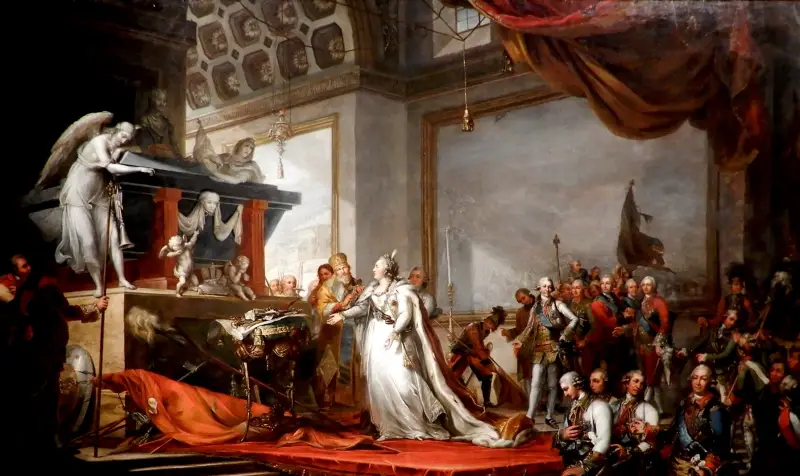
“Catherine II places the trophies of victories over the Turks on the tomb of Peter I.” Hood. Andreas Gyna. State Museum-Reserve "Pavlovsk". Pavlovsk. Russia. Photo by the author.
Was Russia an empire at the end of the 18th – beginning of the 19th century?
We will answer this controversial question this time. We continue the series about the stages of the country’s development associated with formations, the last article of which was “The Golden Age of the Russian Nobility.”
In the course of efforts undertaken during the reign of Peter I, Russia became a full participant in European politics. Modernization provided Russia with the opportunity until the 20s of the XNUMXth century to follow the feudal organic path of development, and the feudal lords, roughly speaking, were armed with modern weapons, technologies and the European management system, provided Russia with security and the possibility of extensive (in the good sense of the word) development. What many mistakenly consider to be imperialism or expansionism, as if inherent exclusively to Russia, but more on that below.
“And with us, not a single cannon in Europe dared to fire without our permission.”
In previous articles, I have written more than once that a number of European countries have embarked on the path of capitalist development; nevertheless, throughout Europe, not only feudal remnants, but feudal regimes and monarchies, the era of “enlightened absolutism” remained. Of course, in the forms of late feudalism, which differed significantly from Russian feudalism, which roughly corresponded to feudalism in France or England in the 13th–14th centuries.
Militarization was the basis of feudal society throughout Europe. The same applies to Russia, which was at the pinnacle of military, feudal capabilities, provided technically and technologically by modernization. This is, firstly.
Secondly, given this situation, the leading players in Europe, England and France, and the supporting players, Austria and Prussia, tried, depending on the current situation, either to attract Russia to their side or to somehow neutralize it.
Subjective factors (matrimonial relations, the whims and preferences of monarchs on the Russian throne and “parties”) also influenced the situation, which the countries skilled in politique cleverly took advantage of. This often negated both the successes of Russian weapons, for example, participation in the all-European Seven Years' War (1756–1763), and the efforts of brilliant Russian diplomats.
The peace initiatives of Emperors Paul I and Alexander I did not find support in the warring countries, since each of them saw more benefits and opportunities from the war: revolutionary France, semi-feudal Austria and Prussia, and bourgeois England.
Thirdly, Russia, having a long border, naturally entered into contacts and clashes with different neighbors, many of whom made both territorial claims (Sweden) and coveted the same territories (Turkey), not counting the complicated relationships in southern borders of Siberia.
The revanchist governments of Sweden twice in the 1769th century, after the Northern War, started wars with Russia. The last raid of the Crimean Khan on Russian lands took place in 1784. Prussia, France and Sweden threatened war during the annexation of Crimea in 1791, and William Pitt the Younger sent a fleet to the Baltic in XNUMX, after the capture of Izmail by A.V. Suvorov, encouraging Sweden to go to war. These are just some examples.
All this forced us to have huge armed forces, an army that had to be able to conduct combat operations in various theaters of operations. The country's defense required resources for the construction of fortresses, fortified lines, modernization of the army, and placed an unbearable burden on the agrarian and feudal Russian economy, even though the costs per soldier were significantly lower than those in European armies.
Therefore, it was not without intention that we included the words of Catherine’s diplomat A. A. Bezborodko in the title.
Russia as an empire?
Peter I took the title of emperor in 1721 and called his state an empire.
The adoption of this title is mistakenly perceived by many as a claim to expansion already during this period. But whether Russia actually became an empire or not, the question remains open.
Questions also remain open: can an early feudal country become an empire and what is “imperial” about advancing to vast, sparsely populated territories?
We do not have any data to confirm purposeful imperial actions in feudal Russia in the 18th century, or even in the first half of the 19th century, although some of them can be identified with such.
Let us repeat, aggression is a natural state for any feudal state, the basis of which is the warrior class, so there was nothing unusual or out of bounds in the actions of feudal Russia: all European powers followed this path.
"The Road to Byzantium"
Road to Byzantium - this inscription was on the arches during Catherine II’s trip to the south in 1778.
The annexation of the Black Sea region took place during a series of difficult and financially costly wars with the Ottoman Empire, which by this time, although significantly inferior in military-technological terms to modernized Russia, remained a formidable military force.
It is significant that even His Serene Highness Prince G. A. Potemkin, who saw enormous potential in the development and settlement of the desert steppe region of New Russia and Crimea, had powerful opponents who believed that the gigantic finances for these events were wasted money, hence the famous epigram in 1791 year on the death of Potemkin-Tavrichesky:
During several wars with the Ottoman Empire, the entire Northern Black Sea region, Kabarda, and Crimea were annexed, which made it possible to develop vast and uninhabited spaces in a favorable climatic zone.
Cities such as Ekaterinoslavl (1787), Mariupol (1778), Kherson (1778), Sevastopol (1783), Simferopol (1784), Nikolaev (1788), Ekaterinodar (1792), Odessa (1794) were created.
Since the 60–70s of the 131,4th century, the population of the Kherson and Yekaterinoslav provinces grew by 1762%, the population of the lands of the former Zaporozhian Army, especially its steppe part, grew from 1786 to 285,5 by 1782%, from 1795 to 235,1 - by XNUMX%.
The territories were developed at enormous expense, but the American J. L. Stefans, who visited Odessa, noted that it was developing faster than any American city, and was built
Siberia
Since the 18th century, peasant colonization sharply increased in Siberia, which replaced military-industrial colonization and, in general, was no different from the colonization of North America by the French and British.
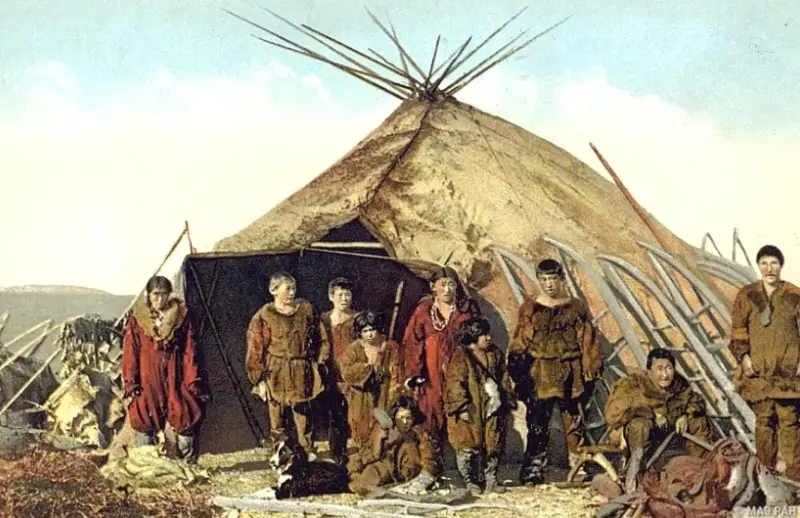
Chukchi. Photo of the first half of the 19th century. From the collection of E. E. Blomkvist. Kunstkamera. Saint Petersburg. Russia.
This was a purposeful policy of the state to secure the south of western Siberia for Russia, where, for example, the Novoishimskaya line was built: from Zverinogoloskaya (Kurgan region) to the Omsk fortress. If in 1710 the Russian population in Siberia was 313 thousand people (70% were peasants), and the indigenous population was 216 people, then in 875 the Russian population was 1767 people. But even in 757, the population of Siberia accounted for only 161% of the total population of the country.
As is the situation in Alaska, which, due to the complete lack of communications with the metropolis (to get here, you had to practically circumnavigate the world) and incessant clashes with the Tlingit Indians, was an extremely vulnerable territory.
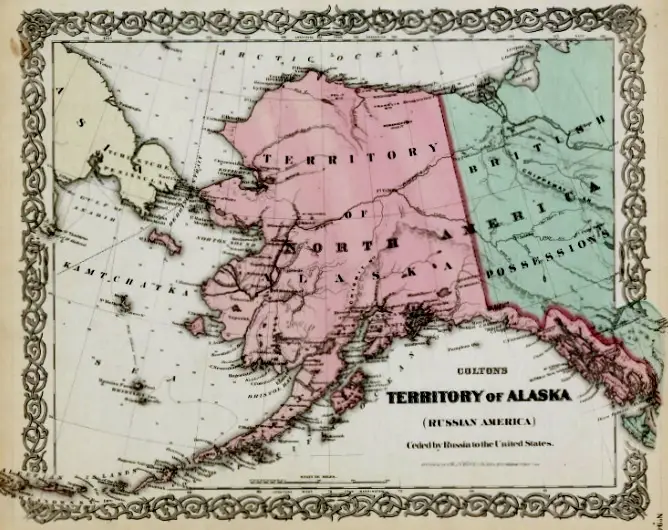
Russian Alaska. 19th century map.
Relations with nomadic ethnic groups (Bashkirs, Kalmyks, Kazakhs) were initially built on the basis of the desire to secure their borders from nomadic raids as part of “organic colonization”; on the other hand, any nomadic society needed interaction and exchange with settled neighbors. Relationships were built by trial and error, often bloody.
This was the case with the Bashkirs or Kalmyks, some of whom migrated to China in 1771. Nomads often entered Russian citizenship based on their current needs, like the Kazakh Khan Abulkhair after defeats from the Western Mongols, the Oirats. Which, according to the Collegium of Foreign Affairs, was contrary to the interests of Russia.
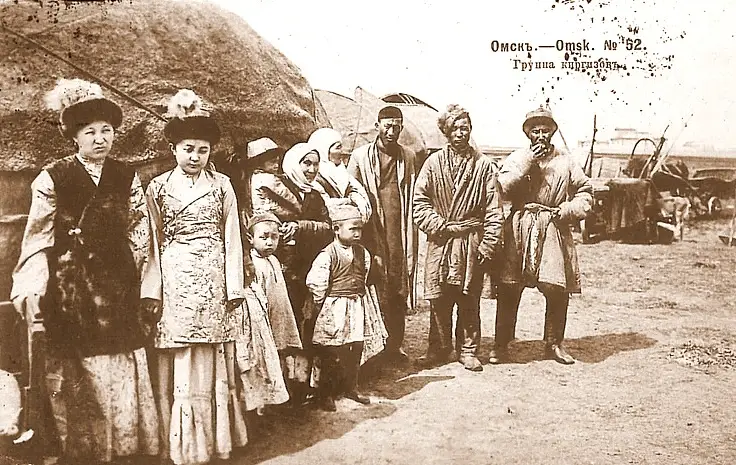
Kyrgyz. This was the name given to all nomadic ethnic groups along the borders of Russia in the Orenburg steppe and Southern Siberia. Photos of Kazakhs, early 19th century.
The unconditional military and economic superiority of sedentary Russia, ensured by modernization, led to the gradual inclusion of nomads into the orbit of the state as part of the tasks of ensuring border security.
Caucasus and Transcaucasia
It is difficult to explain Russia’s gradual involvement in Transcaucasian politics solely by imperial ambitions, especially after the campaigns of Tsar Peter I. Eastern trade occupied only 8–10% of Russia’s total foreign trade, and there was no need to acquire Transcaucasia and wage complex and costly wars here, which is not mentioned the Russian government once stated that it was not. For example, Paul I.
But story ordered differently.
By the end of the 18th century, Russia reached natural borders in the North Caucasus along the Kuban and Terek. Tsar George II transferred the eastern Georgian kingdom of Kartli and Kakheti, torn by internal contradictions and external threats (Iran, the mountaineers of Dagestan and the Avar Khan) under the rule of the Russian Tsar. This literally dragged Russia into the Transcaucasian struggle associated with the ethno-religious conflicts of the “kingdoms” and khanates under the vassalage of Turkey and Persia.
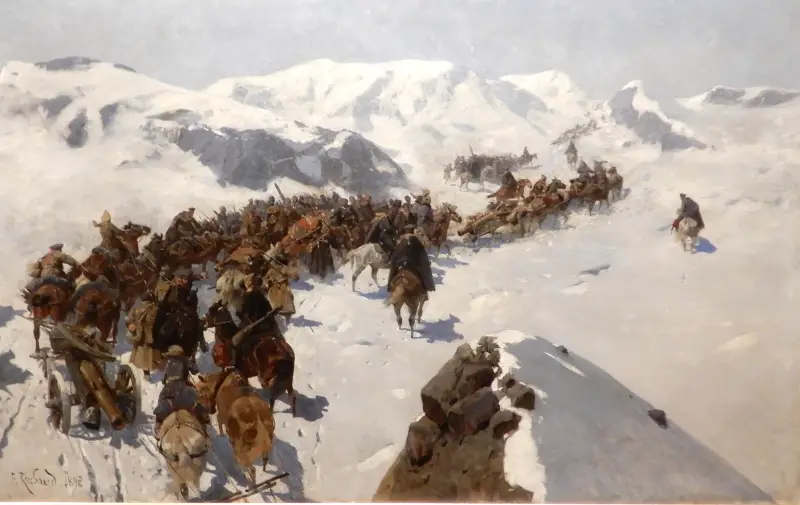
"Prince Argutinsky's crossing of the Caucasus ridge." Hood. Franz Roubo. Museum of Fine Arts. P. S. Gamzatova. Makhachkala. Russia. Photo by the author.
Soon other Georgian state formations, vassals of Turkey, were occupied or annexed: Mingrelia (1803), Imereti (1804), Guria (1810). After the wars with Persia of 1804–1813 and 1826–1828: Shemakha, Nukha, Nakhichevan, Baku and Erivan khanates. And to ensure communications between the main territory of the country and Transcaucasia, a long war began with the highlanders of the western and eastern Caucasus.
Russia and Poland
The problem of the “partition of Poland” “between one German woman and two Germans” was primarily a problem of the country itself, weakened by internal contradictions: the struggle of magnates, landowner gentry with landless gentry - the plebs, religious and class contradictions, when most of the serfs were of a different faith than gentlemen, the reluctance of Catholics to provide equal rights to “dissidents” of other faiths.
The choice of a government system in the form of a “feudal republic” predetermined the fate of the Polish-Lithuanian Commonwealth. The same fate would have awaited Russia if the choice had been made not towards monarchical governance in the 16th – early 17th centuries, like most European countries, but towards aristocratic governance.
The preservation of the Polish state, in the form in which it existed in the 1791th century, would have been impossible under any circumstances. It is not for nothing that in XNUMX the Polish aristocracy established an essentially feudal Constitution, although inspired by the French Revolution, which created a hereditary monarchy and abolished the destructive political institution of liberum veto. Which could no longer help Polish statehood.
First, the lands where the East Slavic rural population lived were annexed, and then the Polish lands themselves were conquered, where the Kingdom of Poland was created as an independent constitutional monarchy.
But the key was another question: both in Poland and in the “taken lands,” as Ukraine, Belarus and Lithuania were called there, the Polish gentry retained power over the serfs, with the exception of confiscations due to participation in uprisings. The class feudal state could not undermine the power of the class-related gentry; now their right to non-economic exploitation of Orthodox peasants was protected by the Russian state.
Poland was connected with Russia exclusively by a personal union; the Russian Tsar was at the same time the Polish Tsar (king). A more socially and economically developed western territory with a different religion was supposed to become a testing ground for future reforms for all of Russia, in the opinion of Alexander I. But it became a “suitcase without a handle” for a whole hundred years, which complicated the development of Russia and burdened management with the solution of unnecessary, additional tasks, diverted resources both to the development of Poland and to the suppression of uprisings.
But, on the other hand, no other options were visible on the political horizon: a revived Poland, laying claim to the so-called "taken lands", would immediately become an enemy of Russia, as she was such from 1809 to 1813, making a disproportionate contribution to the battles on the side of Napoleon.
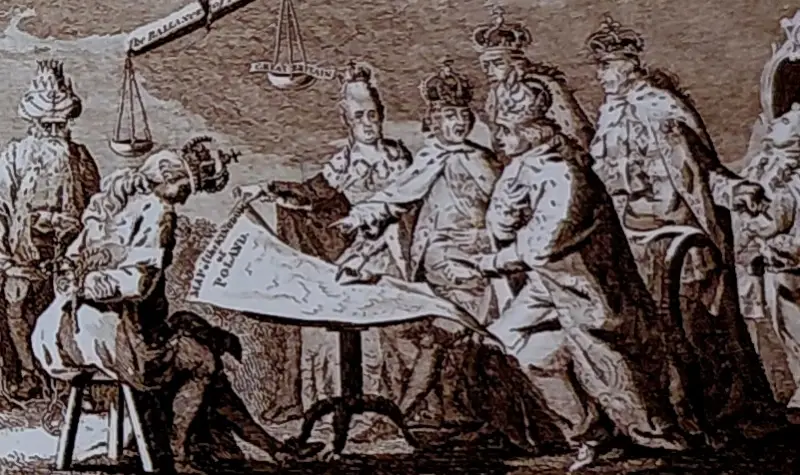
"Sharing the pie." Caricature of the partition of Poland in 1772
Grand Duchy of Finland
Suddenly, the creation of a Grand Duchy on the territory captured from Sweden is explained, as in the case of the Kingdom of Poland, solely by an external threat. Alexander I took this step because of a possible war with Sweden on the eve of Napoleon's invasion of Russia: he left the Swedish aristocrats in power, allowed them to live according to the old Swedish laws, granted rights that this Swedish province did not have, and annexed Vyborg to it .
All European countries in the 18th - early 19th centuries developed along the path of seizing new lands, both in Europe and in the rest of the world, it was a path of natural expansion, and Russia here was more in the rearguard than in the vanguard. Claims against her "special imperialism", at the material level, are associated exclusively with the competitive struggle for resources and the growth of nationalism.
With the development of bourgeois relations, not only the national self-awareness of the masses grows and the nation begins to form as a positive aspect of the social progress of society. A common market for goods requires internal uniformity of communications (language, measurement measures, a single monetary unit), its protection from external influences, and the extraction of resources from foreign ethnic groups. Which always leads to the formation of nationalism, an aggressive form of reaction to external factors, an integral and most important element of capitalism.
Under feudalism, where the division is not ethnic in nature, nationalism does not exist, but there is identification with ethnic markers. The nationalism of the European early bourgeois countries saw a threat where it did not exist, or where it was not significant, and mythologized it, as in the case of the fake “Testament of Peter I” “to conquer all of Europe.” This “testament” was actively used to justify the aggression against Russia in 1812. The so-called “ethnophobia” was multidirectional: both towards Russia and towards France, from England and vice versa.
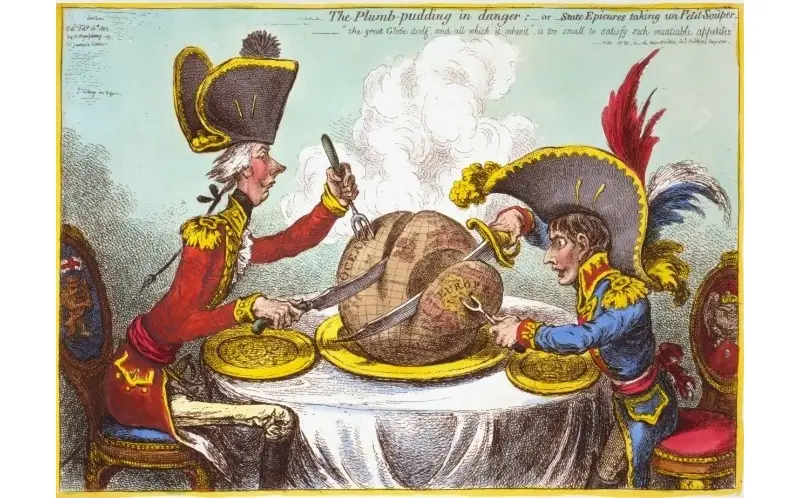
“Christmas pudding in danger” or the division of the world by Pitt the Younger and Bonaparte. Caricature. Hood. J. Giller.
In Russia, many ethnic groups on the outskirts enjoyed significantly greater rights than the Russian serf population, and this was associated with nothing more than feudalism.
It is significant that the enslavement of the right-bank population of Ukraine was not an “imperial” evil intent, but only an act of bringing to uniformity a homogeneous agricultural population in the feudal paradigm. In which ethnic differences have very little significance, and the dividing line lies along the line of attitude to service (first and foremost military): who serves in war, and who serves him in arable land.
And in this regard, any of the “nobles” on the annexed or captured lands was socially much closer to the feudal lords and the feudal state than the Russian serf “people”.
Natural territorial expansion was caused not by an irrational imperial desire to seize an untold amount of land, but by the same exceptional need of the feudal agrarian economy, around which everything was formed: land, serfs, bread.
To be continued ...
Information